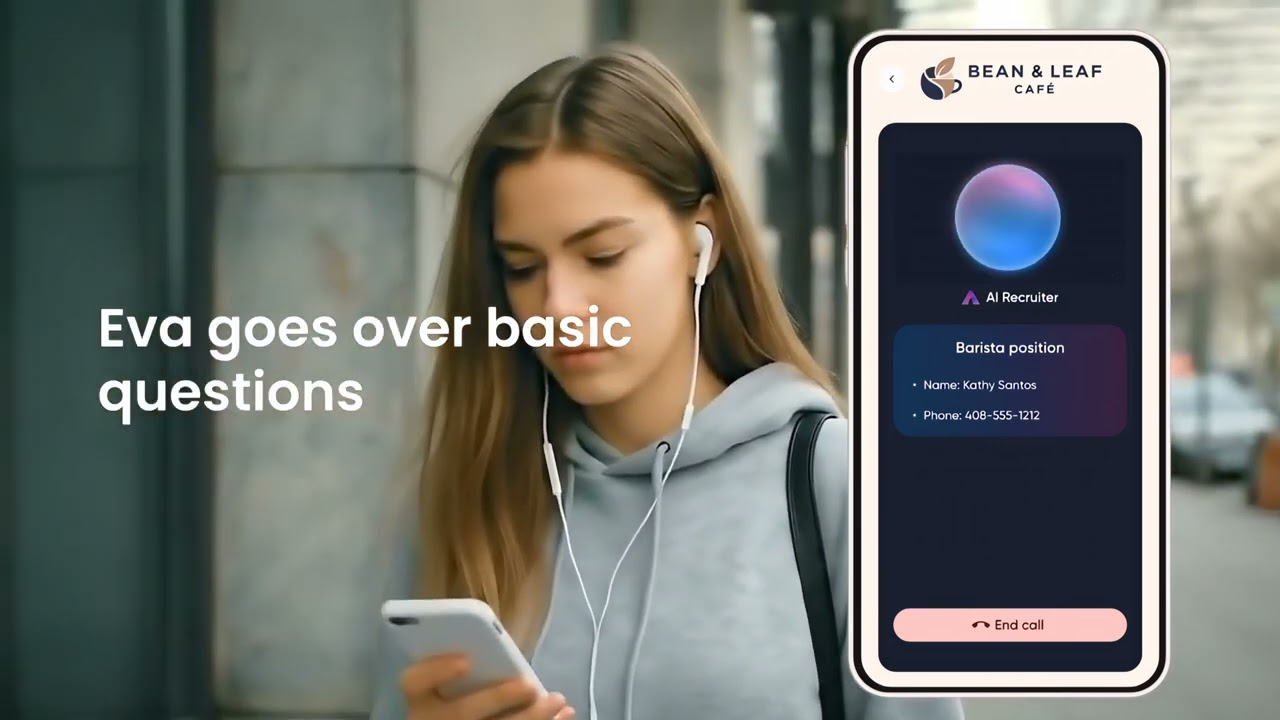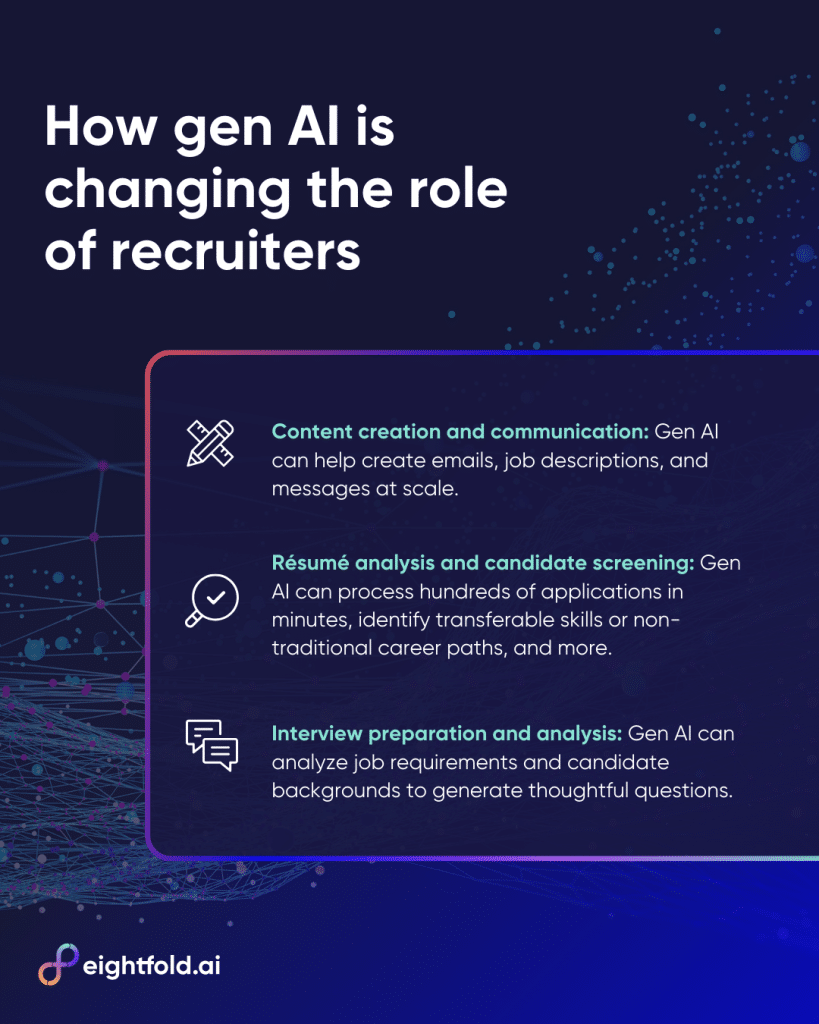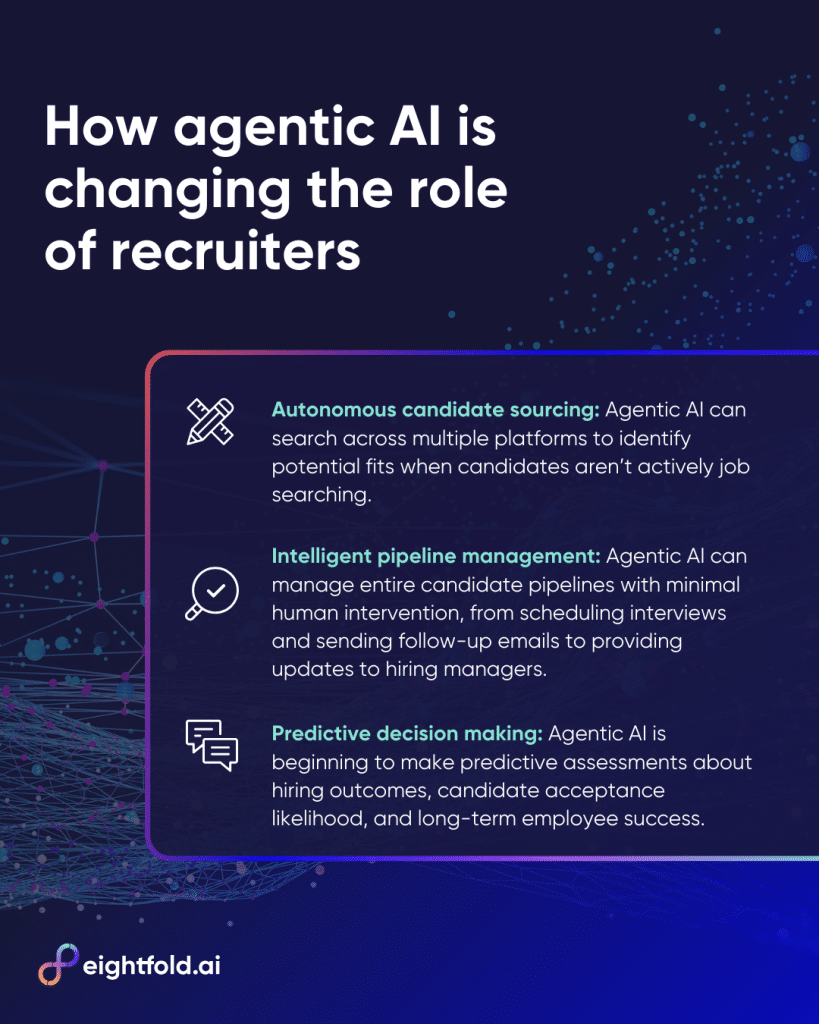- AI agents are helping recruiters manage talent pipelines by scheduling interviews and qualifying candidates.
- Generative AI already creates personalized outreach at scale by analyzing hundreds of résumés, and generating job descriptions.
- Top recruiters use AI as managers and strategists to alleviate time-consuming tasks, and amplify their uniquely human advantages through the technology.
As AI evolves from a futuristic concept to an everyday reality, HR professionals are grappling with two fundamental questions: How will it transform the role of recruiters, and what will that mean for the future of talent acquisition?
The answer lies in understanding two distinct but complementary forms of AI that are already beginning to reshape our industry: generative AI and agentic AI. While gen AI creates content and provides intelligent assistance, agentic AI takes independent action to achieve defined goals.
Together, these technologies promise to fundamentally alter how we work, the skills our business needs, and the value this role brings to the organization.

Learn more about our agentic AI approach to high-volume hiring, designed to help enterprises meet one of their toughest workforce challenges: hiring at scale.
The current recruiting reality
Before exploring AI’s transformative potential, it’s worth acknowledging the challenges facing today’s recruiters. The profession has long been characterized by high-volume, repetitive tasks:
- Screening hundreds of résumés
- Conducting preliminary interviews
- Managing candidate and hiring manager communications
- Maintaining detailed records across multiple systems
Many recruiters spend a disproportionate amount of their time on administrative tasks rather than the strategic, relationship-building activities that drive real hiring success.
This operational burden has created a profession where burnout is common and strategic thinking is often pushed aside by urgent tactical demands. It has also created an environment where the person-to-person element of recruiting — assessing potential, building relationships — gets shortchanged in favor of processing volume.

Gen AI: The intelligent assistant revolution
Gen AI represents the first wave of change already washing over recruitment teams. These systems excel at creating, analyzing, and synthesizing content, effectively serving as highly capable assistants that can handle many of the cognitive tasks that consume our time.
Content creation and communication
Gen AI is revolutionizing how we communicate with candidates and hiring managers.
Instead of crafting individual emails, job descriptions, and outreach messages from scratch, you can now generate personalized content at scale. AI can analyze a candidate’s background and create tailored outreach that feels personalized while maintaining consistency with brand voice and messaging strategy.
Job descriptions, historically time-consuming to write and often poorly optimized, can now be generated with market-tested language, inclusive terminology, and SEO optimization built in.
The technology can analyze successful job postings in similar roles and industries, ensuring each posting attracts the right candidates while avoiding language that might inadvertently discourage diverse applicants.
Résumé analysis and candidate screening
Perhaps the most immediate impact of gen AI lies in résumé analysis and initial candidate screening.
These systems can process hundreds of applications in minutes, extracting key information, identifying relevant skills and experience, and providing detailed summaries that highlight why a candidate might be a good fit.
More sophisticated implementations can even identify transferable skills and non-traditional career paths that we might overlook.
The technology goes beyond keyword matching to understand context, assess the quality of experience, and identify patterns that correlate with success in specific roles.
This means you spend less time on initial screening and more time on meaningful candidate interactions.
Interview preparation and analysis
Gen AI is also transforming interview processes. AI can analyze job requirements and candidate backgrounds to generate thoughtful, role-specific interview questions that assess technical competencies and cultural fit.
Post-interview, these systems can analyze interview notes and recordings to identify key insights, potential red flags, and alignment with role requirements.

Agentic AI: The autonomous revolution
While gen AI enhances our capabilities, agentic AI represents a more fundamental shift: systems that can take action to achieve recruiting goals.
These AI agents can operate with minimal oversight, making decisions, taking actions, and adapting their approach based on results.
Autonomous candidate sourcing
Agentic AI systems can continuously search for candidates across multiple platforms, using sophisticated algorithms to identify potential fits even when candidates aren’t actively job searching.
These systems can also engage in preliminary outreach, qualify interest levels, and maintain ongoing relationships with passive candidates until relevant opportunities arise.
Unlike traditional automated sourcing tools that require constant human configuration, agentic AI adapts its search strategies based on results, learns from successful placements, and refines its approach over time.
It can identify emerging talent pools, recognize shifting market conditions, and adjust sourcing strategies accordingly.
Intelligent pipeline management
Perhaps most significantly, agentic AI can manage entire candidate pipelines with minimal human intervention.
These systems can schedule interviews, send follow-up communications, provide updates to hiring managers, and even make preliminary assessments about candidate progression through the hiring process.
The technology can balance multiple competing priorities — candidate experience, hiring manager preferences, organizational policies, and market timing — to improve outcomes for all stakeholders.
When issues arise, agentic AI can escalate appropriately while continuing to manage routine pipeline activities.
Predictive decision-making
Advanced agentic AI systems are beginning to make predictive assessments about hiring outcomes, candidate acceptance likelihood, and even long-term employee success.
By analyzing vast data sets of hiring decisions and subsequent performance, these systems can provide recommendations about salaries, role modifications, and hiring timeline adjustments that improve the probability of successful placements.
Related content: Learn how AI recruiting agents can help screen candidates, cut time to fill, and find quality hires at scale.
The evolving recruiter role
As AI handles more routine tasks, your role as a recruiter will evolve toward higher-value, distinctly human activities. Tomorrow’s success will focus on areas where our judgment, creativity, and relationship-building remain irreplaceable.
Strategic talent planning
Freed from daily administrative tasks, you will spend more time on strategic talent planning. This includes working with business leaders to anticipate future skill needs, identifying critical talent gaps, and developing proactive sourcing strategies, especially for hard-to-fill roles.
More strategic recruiting will include analyzing market trends, assessing competitive landscapes, and advising leadership on talent acquisition strategies that support long-term business objectives. You are a true partner to the business, not an order-taker.
Relationship building and
While AI can screen for skills and experience, assessing good fits and building meaningful relationships remains fundamentally human.
Recruiting now includes even more highly personalized work like understanding what skills the organization needs in the future, assessing potential, and building long-term relationships with candidates and hiring managers.
This includes conducting in-depth conversations about career aspirations, providing career counseling, and serving as trusted advisers throughout the hiring process. The human touch becomes more valuable, not less, as other aspects of recruiting become automated.
AI management and performance
Paradoxically, the rise of AI creates new technical responsibilities. We must learn to work effectively with AI systems, understanding capabilities and limitations, optimizing performance, and ensuring these align with our organizational values and legal requirements.
This includes training AI systems on business-specific requirements, monitoring for bias in AI decision-making, and maintaining the human oversight necessary to ensure ethical and effective recruiting practices.
Challenges and considerations
The AI transformation of recruiting isn’t without challenges. We all must learn to navigate issues of bias in AI systems, ensure compliance with evolving employment law, and maintain the human elements that make recruiting effective.
- Bias and fairness: AI systems can perpetuate or even amplify existing biases in hiring data. We must implement robust testing and monitoring to ensure AI-driven recruiting promotes diversity and inclusion rather than undermining it.
- Candidate experience: While AI can improve efficiency, we must balance automation with human touch. Candidates still want to feel valued and understood throughout the hiring process, requiring careful consideration of when and how to deploy AI versus human interaction.
- Legal and compliance considerations: As AI takes on more decision-making responsibilities, we must ensure compliance with employment law, particularly around discrimination and privacy. This requires ongoing legal review and policy development as AI capabilities expand.
Preparing for the AI-driven future
The question isn’t whether AI will transform recruiting — it’s how quickly and effectively we can adapt to use these technologies while maintaining our human advantages.
Skills development
We must develop new skills in AI management, data analysis, and strategic planning while maintaining our core competencies in relationship building and cultural assessment. We should invest in training programs that prepare our teams for this hybrid human-AI future.
Technology strategy
We need clear strategies for AI adoption in recruiting, including vendor evaluation, integration planning, and change management. The goal should be enhancing our capabilities, not replacing human workers.
Cultural adaptation
Perhaps most importantly, we must cultivate cultures that embrace AI as a technology for enhancement rather than replacement. This requires leadership commitment, clear communication, and ongoing support for team members navigating this transition.
Embracing the AI-powered future of recruiting
The integration of gen and agentic AI into recruiting represents one of the most significant transformations in the history of talent acquisition.
While the changes will be profound, those shifts ultimately point toward a future where we can focus on the most valuable, uniquely human aspects of our work: building relationships, thinking strategically, and attracting and retaining the talent we need to succeed.
The ones thriving in this new environment will be those who embrace AI as a powerful ally and develop the skills needed to work effectively with it and focus on the human elements that make recruiting an art and a science.
The future belongs not to AI or humans alone, but to the powerful combination of working in harmony toward shared goals.
Request a demo and learn how Eightfold AIRecruiter can help transform your talent acquisition strategy.
